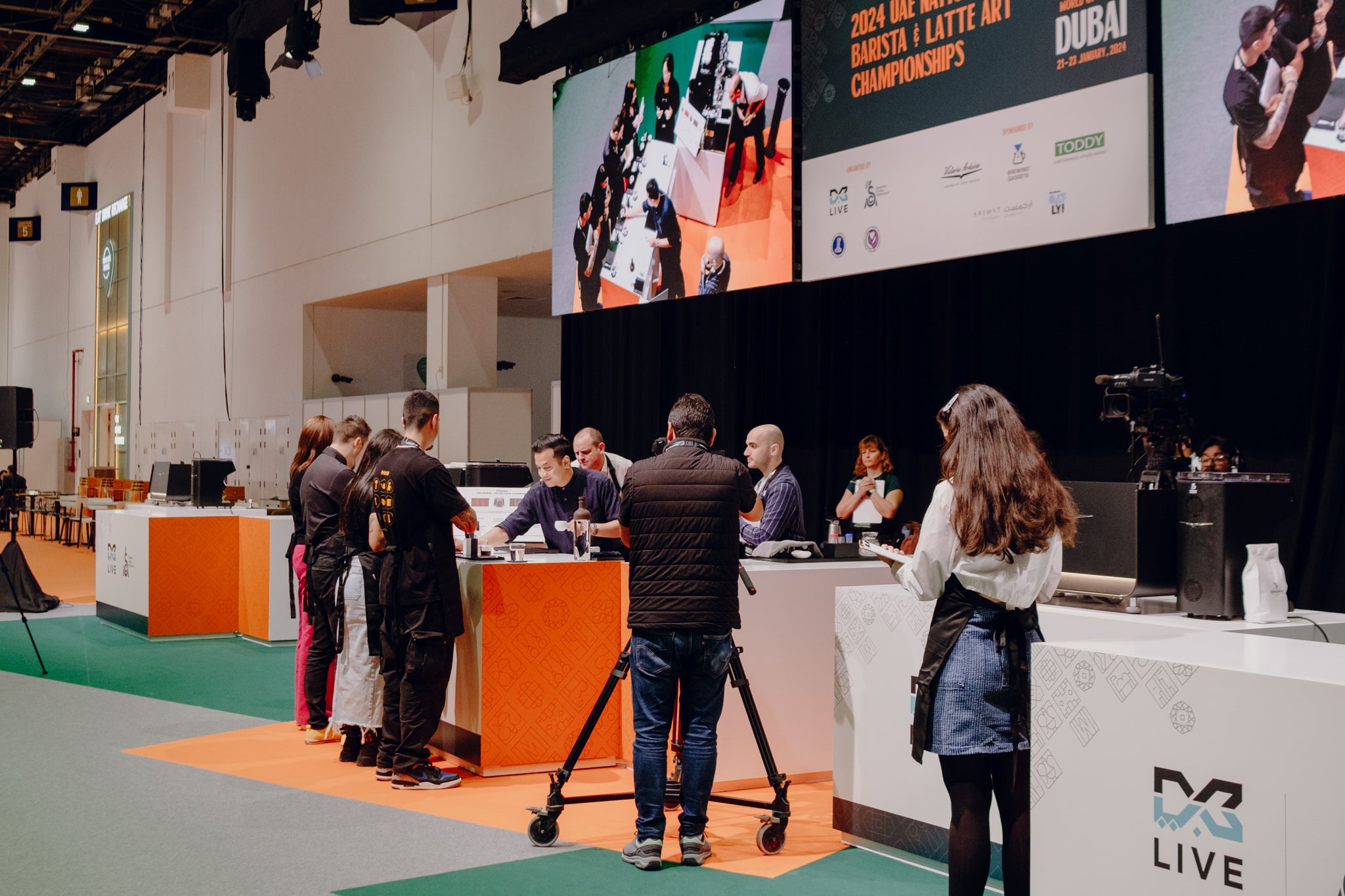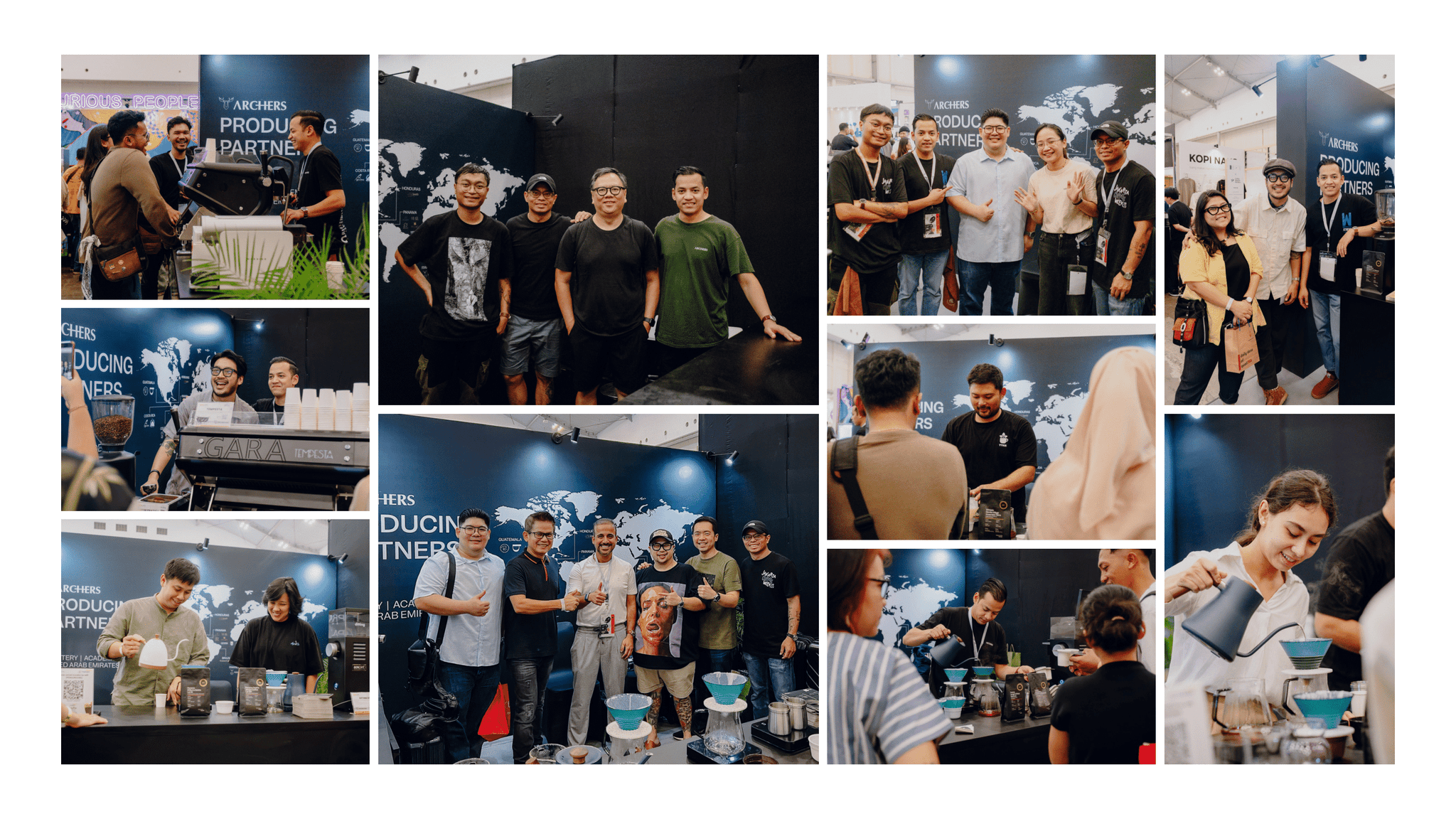Kemal Risyad has come close to the UAE National Barista Championship thrice, scoring the Silver each time. In this Archers Conversation, he takes us through his specialty coffee journey, his thoughts on competition, how he keeps going, and why he thinks every coffee person with a competitive spark, regardless of outcomes, should, too.

Start in Coffee
Kemal’s fascination with coffee started after stumbling upon whole roasted coffee beans at a supermarket aisle on a random grocery run en route home from work as a car mechanic in Jakarta.
His initial thought had been, “Who would use whole coffee beans you have already ground ones?” stemming from his experience of drinking only instant coffee until then for much-needed energy boosts throughout the strenuous shifts at his uncle’s garage.
Curiosity winning out on skepticism, he bought a bag to gift to his father — a man he knew to be of artisanal interests and wide-ranging knowledge — and perhaps get an answer. When he presented the coffee to his father, the latter, to Kemal’s surprise, responded with, “I have a grinder.”
As he recounted, the elder Risyad then proceeded to retrieve it from their garage — to his memory, a storehouse of untold, even eccentric, objects collected over the years — and emerged with a vintage Hario grinder that they dusted off and then used to prepare the coffee. He remembers tasting it and thinking it was the best.
Over this brew, his father told him about a large coffee factory, a commercial coffee operation originally established by the Dutch and then handed over to the locals in their province’s vicinity. Kemal visited it and, for the first time, got a glimpse into single-origin coffees, albeit all from regions within Indonesia.
Intrigued, he dove into internet research and came across a known specialty coffee company dealing in international single-origins and offering specialty coffee education programs. Then, still a mechanic by profession, he enrolled in their barista class, contemplating specialty coffee as a serious hobby.
By the end of the course, though, he felt differently, knowing he wanted to redirect his career along the lines of specialty coffee. Asked why, Kemal shared that, growing up, he was “trained off possibilities,” and the unpredictability he hadn’t expected and was then beginning to discover in coffee attracted him to explore it further.

Working in Coffee
His first stint as a specialty coffee practitioner was as a barista at an airport kiosk. Self-driven and determined to work with the best in the field, he reached out to an industry leader through their social media, scored an interview, and soon, a job that opened the door to the deeper specialty coffee learning he was after.
While his formal role was as a barista at one of the company’s retail outlets, he was granted access to the HQ, where he immersed himself in all things specialty coffee during all of his free time, even if it meant extending his commute and commensurately mounting related expenses.
It was all worth it to him because whenever he was there, in his words, “At least, I could hear or talk about coffee or taste coffee… [and] I was already happy.” He embraced every chance to take on different tasks as long as he could be near the coffee. He recounted, “I became the production guy packing, or when the containers came … I was so happy… for me to actually put that [coffee] on my back.”
The pivotal moment that convinced him to stay in specialty coffee happened during a cupping at the HQ when he tasted his first coffee from Ethiopia. Past the unpredictability that attracted him in the initial stages of his curiosity about coffee, this unexpected sensory experience stirred a greater sense of wonder and spurred more questions about coffee’s complexity.

He shared, “So when I had that coffee, I saw opportunities … If coffee tastes like this, and it tastes like lemongrass to me… How about the coffee that comes from Kenya? What about the coffee that comes from Costa Rica? Oh, what about the Honey Process? Oh, what about that Washed… and from what regions?… And then, knowing that coffee is actually an agricultural product, the harvest changes when the weather changes… It just cannot be the same anymore… Since then, I got hooked on coffee.”
Competition & Community in Indonesia
His interest intensified into a passion that sought expression outside of the available opportunities in the company. This led him to venture into coffee competitions by way of throwdowns, which allowed him to form connections with coffee people on the same wavelength and who were tracking the same upward trajectory as him while building a reputation in the Indonesian specialty coffee community as one of its most committed and passionate practitioners.

These connections would turn out to be enduring and enriching over time and across distances, even with Kemal eventually uprooting and moving to the UAE.
Starting Over in the UAE
Kemal moved to the UAE to join his brother, who had been working at a bakery that had an open position for a barista, but not for specialty coffee.
At that time, since there was not yet an established specialty coffee scene in the country, he remembers feeling as though he had taken a significant step back when he considered the professional progress of his peers in Indonesia and the competition scene there as a measure of the community’s maturity and momentum.

To keep pace, at least in terms of knowledge, Kemal made sure to keep himself updated by continuing to trade notes with his connections, self-studying and conducting coffee projects at home (e.g., putting together a 100-gram roaster), and staying abreast of the national and world coffee competitions.

Ever on the lookout for opportunities to enhance his capabilities and advance in the profession, he also made it a point to attend UAE coffee events to learn from the competition proceedings and network within the community.
The available specialty coffee career prospects in the country then, however, had yet to align with his passion and abilities. Nearing the conclusion of his contract with the bakery, he almost left the UAE.
It was only by coincidence that Kemal — getting ready to head home to Indonesia and looking to buy bags of specialty coffee as souvenirs for his friends — met a specialty coffee job opportunity that aligned with his aspirations, leading him to stay.
It was through Frederick Bejo, who remains a key figure in Kemal’s specialty coffee journey.
Coffee Competition Journey
Asked why he competes — apart from the adrenaline rush and the ensuing dopamine release —Kemal shared that it’s because coffee competition allows him to combine and direct his infinite curiosity about coffee and intense passion for it toward meaningful ends.
Citing his recent performance at the 2024 UAE National Barista Championship, where he finished as 1st runner-up, he highlighted that his main aim was to bring broader awareness around the possibility for anyone — from the farm level to the consumer — to contribute to inconsistency in perceiving a coffee’s merits with consequential effects across the chain, and to propose a plausible solution to diminish the chances of that happening. And that was through his concept, Sensory Baseline Calibration.
He also emphasized that the benefit of competing is that even near-wins, like his, can give our community and industry something of far-reaching and resonant value. On top of that, he considers every time he has gone on stage a priceless and inevitable opportunity for self-improvement.

He shared that, from his first venture into the UAE national competition arena, which was at the UAE National Brewer’s Cup — not yet representing Archers — he learned a lot about his weaknesses and strengths by humbly taking constructive feedback from the people he trusts, as well as by observing the more seasoned competitors and their respective support teams in action.
Through the succeeding competitions, carrying the Archers banner — UAE Brewers Cup 2019, where he placed 3rd, and UAE National Barista Championship 2022 and 2023, where he brought home the Silver — he has been able to increase his self-awareness and ability to incrementally identify the finer points for improvement, not only in the technical aspects of his routine but also in his presentation skills, as well as the entirety of his preparations.
With the heartfelt teamwork of his core coaching and support group — Frederick Bejo, Dave Peralta, Jane Espante, Romeo Perello, and Karen Gatmaitan, generous mentorship from the likes of Mikael Jasin, and inspiration from the World Barista Competitors he admires the most, Kemal is excited about enriching his concepts and resonating with more coffee people in the future.
Promoting Consistency: Sensory Baseline Calibration (SBC)
By introducing the concept of “sensory baseline calibration” in his 2024 UAE National Barista Championship routine featuring Abu Coffee Double Phased Anaerobic Panama Geisha, he contributed a new way of possibly improving the consistency and uniformity of taste and flavor perception across our community, which influence how coffee is experienced, valued, and rewarded.
Kemal described one practical application of the SBC concept in the day-to-day lived experience of a specialty coffee cafe barista. At the minimum, it empowers every barista with a competently reasonable response to customers who may negatively critique a particular coffee as not tasting as good as the last one they tried.

For the specialty coffee roastery or cafe customer, the idea of SBC alone encourages them to consider how their enjoyment of any coffee depends on the readiness and ability of their palate to perceive its sensory characteristics, and not just the quality of the brew itself as cumulative outcome of the coffee bean’s quality, proper roasting, and the brewer’s skill.
On the broader scale, the considerably unfortunate outcome if the consuming side is no longer able to perceive and appreciate a great coffee as such because palates have not been reset, so to speak, to a uniform and consistent starting point, players on the producing side, under pressure to churn out profiles that favor novelty above anything else, may be compelled to increasingly innovate away from the fundamentals that — like variety, terroir, traceability and sustainability —the very notion of specialty coffee was built on in the first place.
For that reason, Kemal believes that it’s a must for coffee professionals to stay calibrated. For consumers, a simple approach he suggests is to do some kind of personal palate reset from time to time by drinking or just tasting a regular specialty coffee alongside a higher-end specialty coffee. It will also help to introduce more diversity into their rotation of coffee. It could be in terms of origins, for example, to familiarize their senses with and potentially sharpen their perception of the unique nuances of each.
A Message to Aspiring & Returning Competitors
To close this Archers Conversation, Kemal shared his message for aspiring and returning competitors — each one a potential, future champion.

“We know that in any competition, the champion is only one.
But then I want to offer my perspective that, even if you compete to win — of course, everyone competes to win — and you don’t get that trophy, how you actually evolve after is your victory.
Because of my journey, my belief is that a champion will be a champion because they work like a champion. It’s because we continue to face the challenges that ultimately shape us as better persons.
It’s our mindset and persistence that transform each one of us into a person who is original, unique, and has integrity. And then we can keep striving so that the trophy we are aiming for will come in time.”
